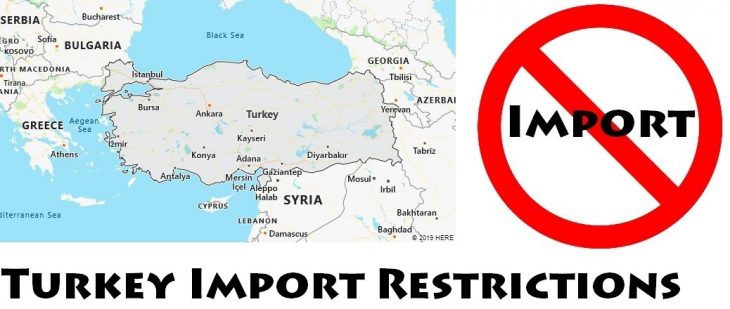Turkey Import Restrictions
In order to enter Turkey, certain goods are subject to specific controls and, regardless of their value and quantity, they require the consent of Turkey government, preferably, license must be obtained prior to passage through the customs, preventing the goods from being retained. On this page, you will see what kinds of items are prohibited from entering the Turkey, and which items need special documentation before exporting to Turkey.
Import regulations
Senders should determine import restrictions from Turkish authorities before posting:
- Alcoholic beverages
- Bees and leeches
- Butter
- Ceramic products
- Coffee
- Cologne and perfume
- Computer software, components and parts
- Cosmetics
- Diplomatic mail
- Drugs: Prescription and non-prescription
- Electronic equipment
- Firearms
- Foodstuffs
- Food supplements and foods for athletes to Turkey is also prohibited. However, this restriction is waived in cases where a medical report, prescription or national sportsperson’s certificate is presented by the addressee
- Glass products
- Ivory
- Labels
- Leather goods
- Maps
- Medical/dental supplies and equipment
- Meat products
- Mineral waters
- Parasites and insect killers
- Personal effects
- Phones/modems
- Plants and parts of plants
- Radio equipment
- Samples, textile
- Seeds
- Silkworm eggs
- Soap
- Tea
- Tobacco
- Textile articles
- Thermometers, medical
- Tobacco
- Vegetable fats and oils, industrial.
Turkey requires an import permit for most commercial goods. Before posting any item, senders should confirm that the addressee has any necessary permit.
Special documentation requirements
Commercial goods require an inserted invoice. Mark the outside of the article facture inseree. Dutiable goods exceeding 50 turkish pounds require a certificate of origin endorsed by a turkish consul. Used clothing, bedding, carpets, sacks and so on, require a certificate of disinfection.
The sender and receiver details must be addressed with a valid street address in English. A Post Office Box address is not acceptable.
The sender is responsible for finding if the destination country may impose duties, taxes, brokerage fees or any other fees that may be applied on the item that is being sent. Please contact the consulate office of the country you are sending to or contact the ECI customer contact centre on 1800 007 678.
Prohibitions
In addition to items prohibited by Dangerous and Prohibited Goods & Packaging Post Guide and ECI International Courier Regulations, Turkey prohibits:
- Antiques
- Asbestos
- Alcohols and alcoholic beverages
- Binoculars
- Cigarette paper
- Coffee and tea
- Contraceptives and advertising
- Dangerous goods, haz or comb materials
- Flour
- Furs
- Gambling Devices
- Invoices, blank
- Lottery tickets and advertising
- Measuring apparatus, non-metric
- Molasses
- Pepper, white
- Playing cards
- Pornography
- Precious metals and stones
- Propaganda against Turkey
- Saccharine
- Saffron
- Salt
- Shaving brushes made in Japan
- Soil
- Tobacco and tobacco products.
Transporting food of any kind is prohibited under ECI Platinum.














































